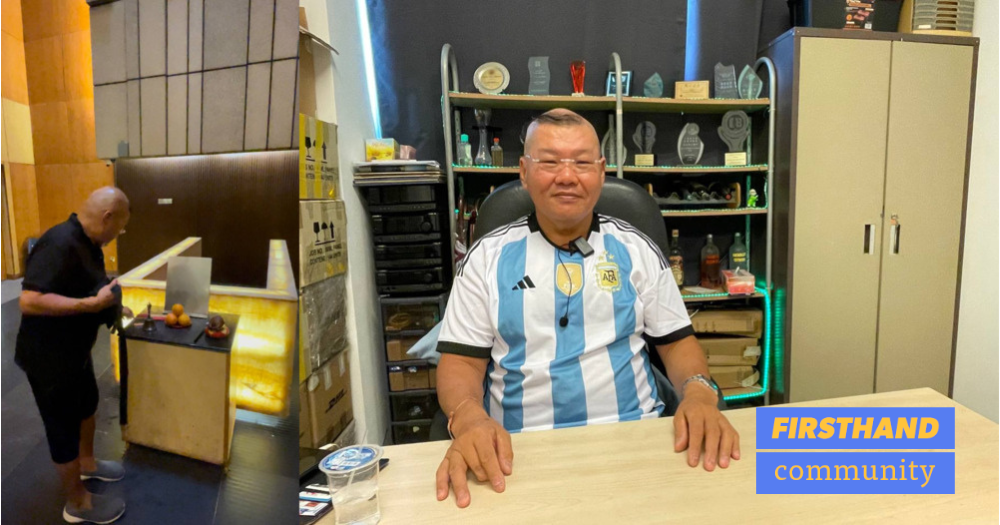Firsthand: Community is a new series by Mothership, where we explore the spirit of community in Singapore through in-depth articles and videos.
From Tampines to Tuas, we’ll investigate the untold stories of the different neighbourhoods in Singapore — firsthand.

A small group gathered in front of the coffin, looking down in silence. I stood a little further back in the funeral service hall, observing the last rites.
Two of the dead man's colleagues held joss sticks in their hands, while a monk chanted some prayers.
Together with them to assist with the last rites was Tommy Yu, who was not related to the deceased. He bowed his head anyway, holding both hands in front of his chest.
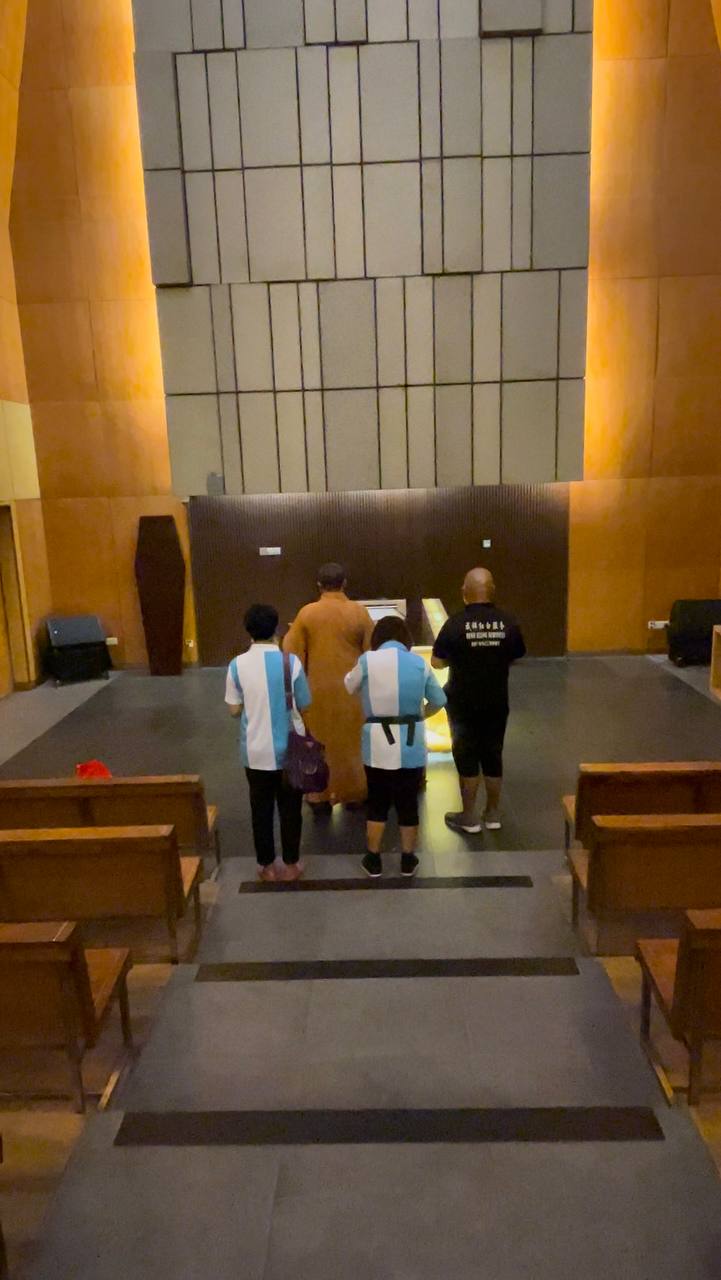
The funeral hall is big, with rows and rows of empty seats surrounding me. The group, clustered to the front, looks incredibly small.
"This is already more than the usual crowd," Yu would later tell me, speaking in Mandarin.
"Usually, it's just me and the monk," he said, matter-of-factly.
For this particular funeral, Yu, along with some social workers, attempted to contact the dead man's sister about his death.
But his sister had refused to be recognised as the man's next-of-kin.
There was no one left in his family to arrange or attend the funeral. So, Yu took it upon himself to arrange the last rites for him.
Yu, 58, is no stranger to cases like these. Many old folks have no next-of-kin to help them with their last rites after they die, he said.
Since 1986, he has helped arrange pro bono funerals for needy and estranged elderly folks.
Yu is also the director of Seng Xiang Services, a commercial funeral service that he started in 1990.
A decades-old friendship
According to Yu, there are more estranged elderly folks than you'd think.
"Some of them made mistakes when they were younger, and their families no longer want to be associated with them," Yu explained. "Their children have lost contact with them, and they've been divorced for decades."
When someone loses touch with their family members, the family sometimes doesn't return to take responsibility of the funerals and hospital fees, Yu told me.
"If you only interact with your social circle, and if you eat well and live well, you might not feel that these people exist," Yu continued. "But I've spoken to many of them."
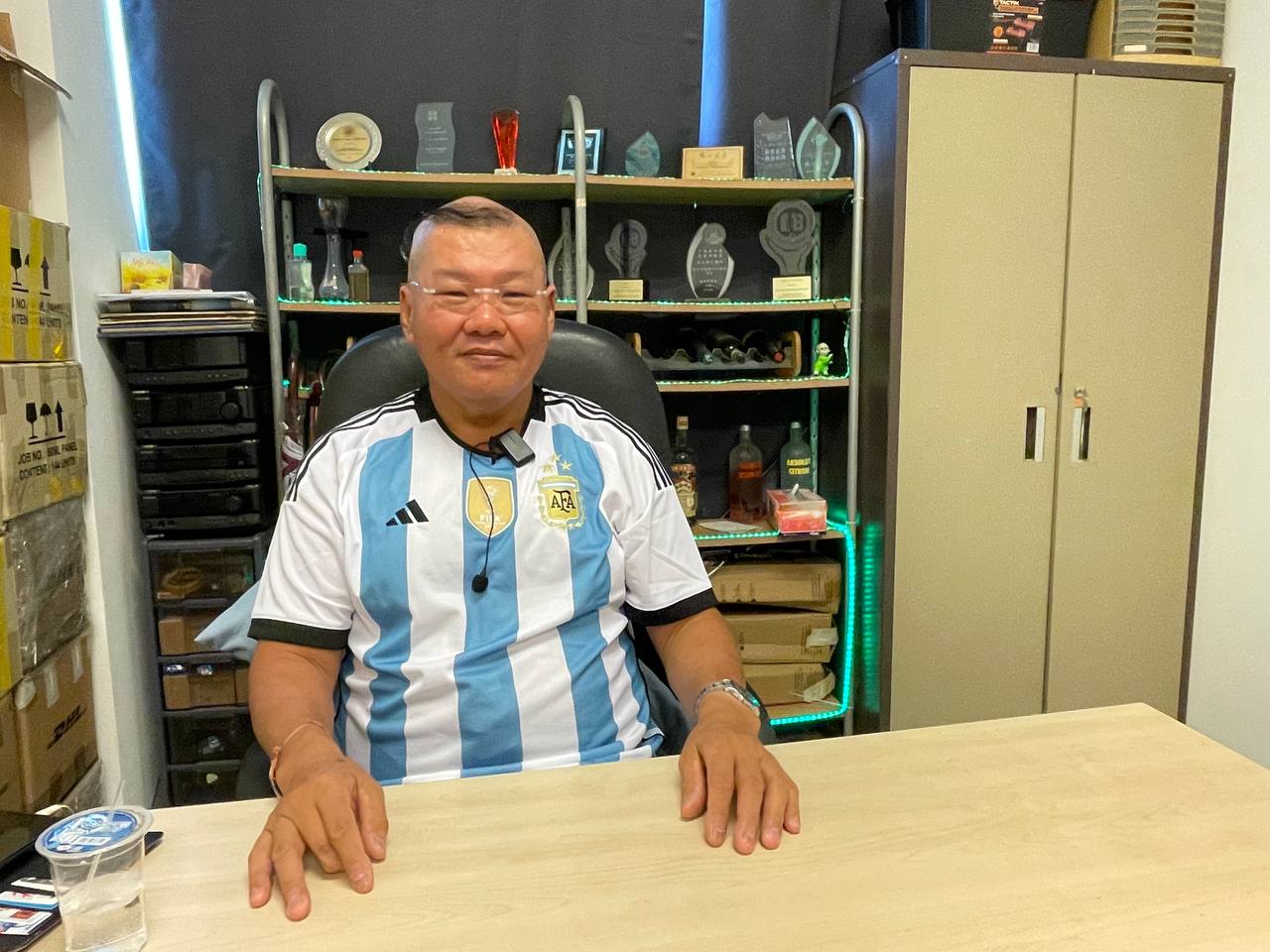
In his youth, Yu was not formally enrolled in school. He spent most of his days loitering at the HDB blocks in Redhill.
When he was 15, he was drawn to the sound of a nearby getai singing event in the void deck.
That was his first encounter with an elderly activity centre. A member of the centre invited him in, and began chatting with him.
But it wouldn't be long before they were interrupted.
"They hadn't even finished talking, when someone came to disturb us," Yu recalled. "He stood at the door, knocked very loudly, and asked the old folks to come out one by one. In other words, he was looking for a fight."
He recalled fondly:
"The old folks were silent, because he was very fierce.
So I stood up and told him that if he wanted to fight, he should fight me first!"
Fortunately, Yu managed to defend the old folks and chase the hooligan away. That was the start of his friendship with the old folks at the activity centre.
"If I didn't go to the centre, I would just be loitering at the coffee shop or the market anyway, looking for trouble," Yu said with a smile. "So, I might as well sit at the elderly activity centre. I can protect these old folks while I'm at it."
As time passed, Yu became more and more involved with the lives of the elderly at the centre.
Many of these elderly were also Samsui women — first-generation Chinese immigrants who worked construction or industrial jobs in Singapore. They often didn't have any next-of-kin living with them.
He eventually started to help with resolving disputes, or taking care of them when they suffered falls in their homes.
Eventually, when these old folks began to pass on, the next logical step was for him to arrange their last rites as well.
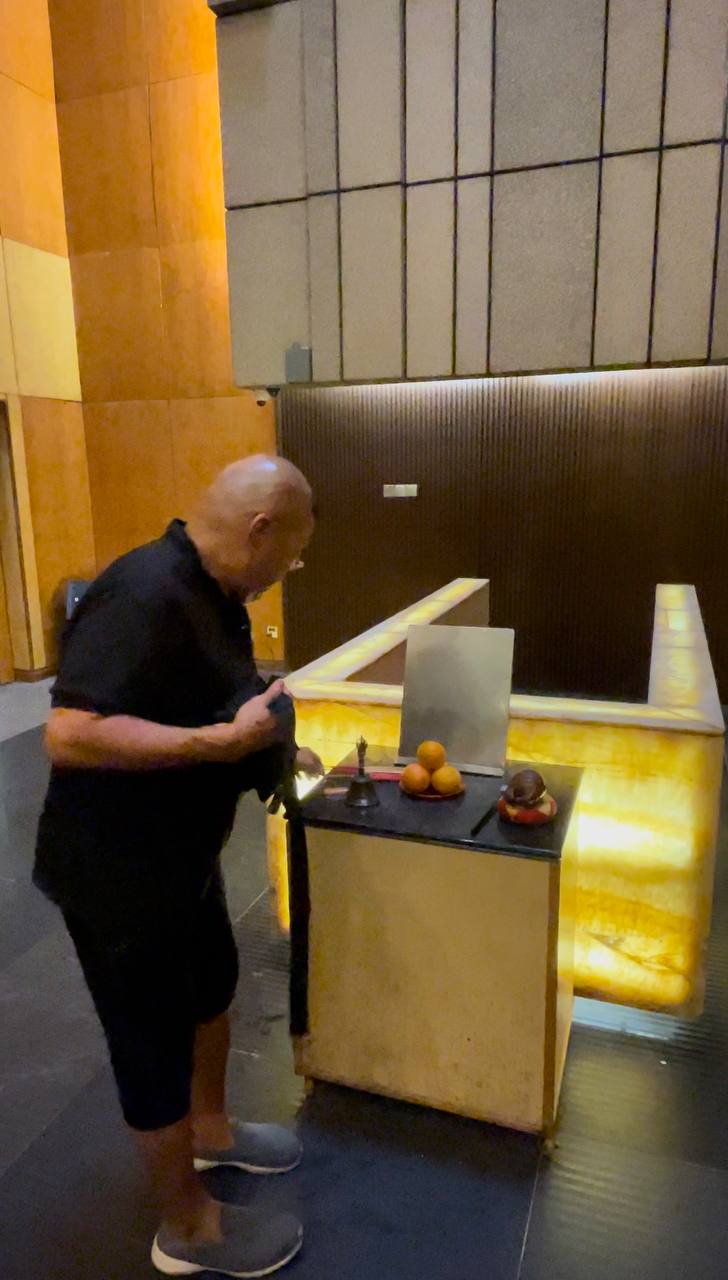 Yu prepares for the last rites of an estranged dead person.
Yu prepares for the last rites of an estranged dead person.
A humble office
With his wealth of experience interacting with old folks, Yu founded a volunteer organisation that visits and organises activities for socially isolated and needy elderly residents in the Bukit Merah, Redhill, and Bukit Ho Swee areas, along with organising pro bono funerals.
The organisation, Love and Unity Volunteers Establishment (Luve), is headquartered in a small room tucked away in an industrial estate in Woodlands.
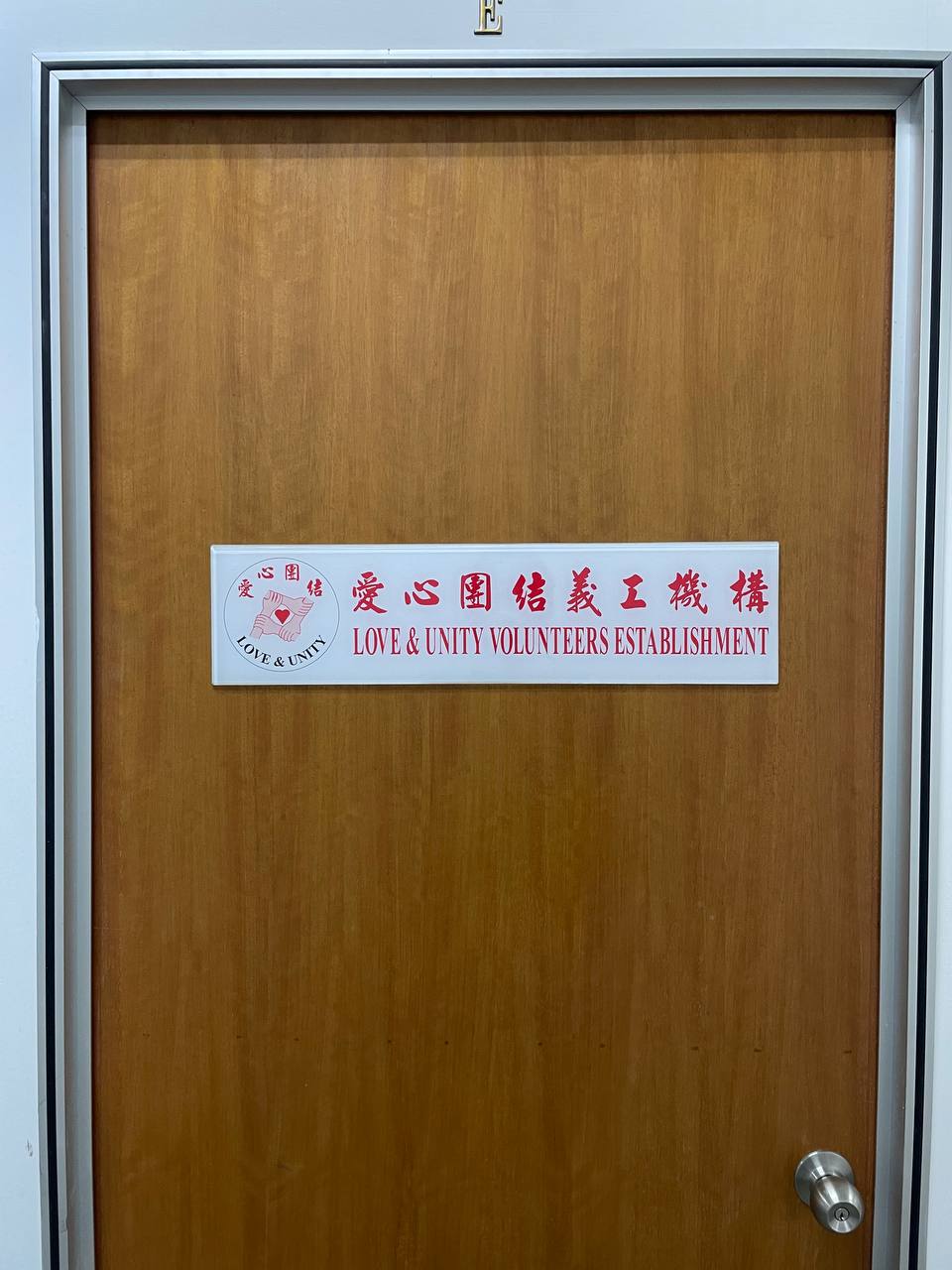 The door that leads to Luve's office.
The door that leads to Luve's office.
When I paid Yu a visit in the office, there were several packets of rice stacked on the tables, leftovers from a donation drive they recently held.
The room felt rather old and cosy, with a yellow tint to the lighting.
"Everything you see around you is donated," Yu told me. "We didn't buy a single thing, except the photo frames on the walls. Even the light bulbs were donated—that's why the room looks a bit yellow."
"We don't need a beautiful office. For us, the most important thing is to have a space to store rice, canned food, and other things that people donate [to the elderly]."
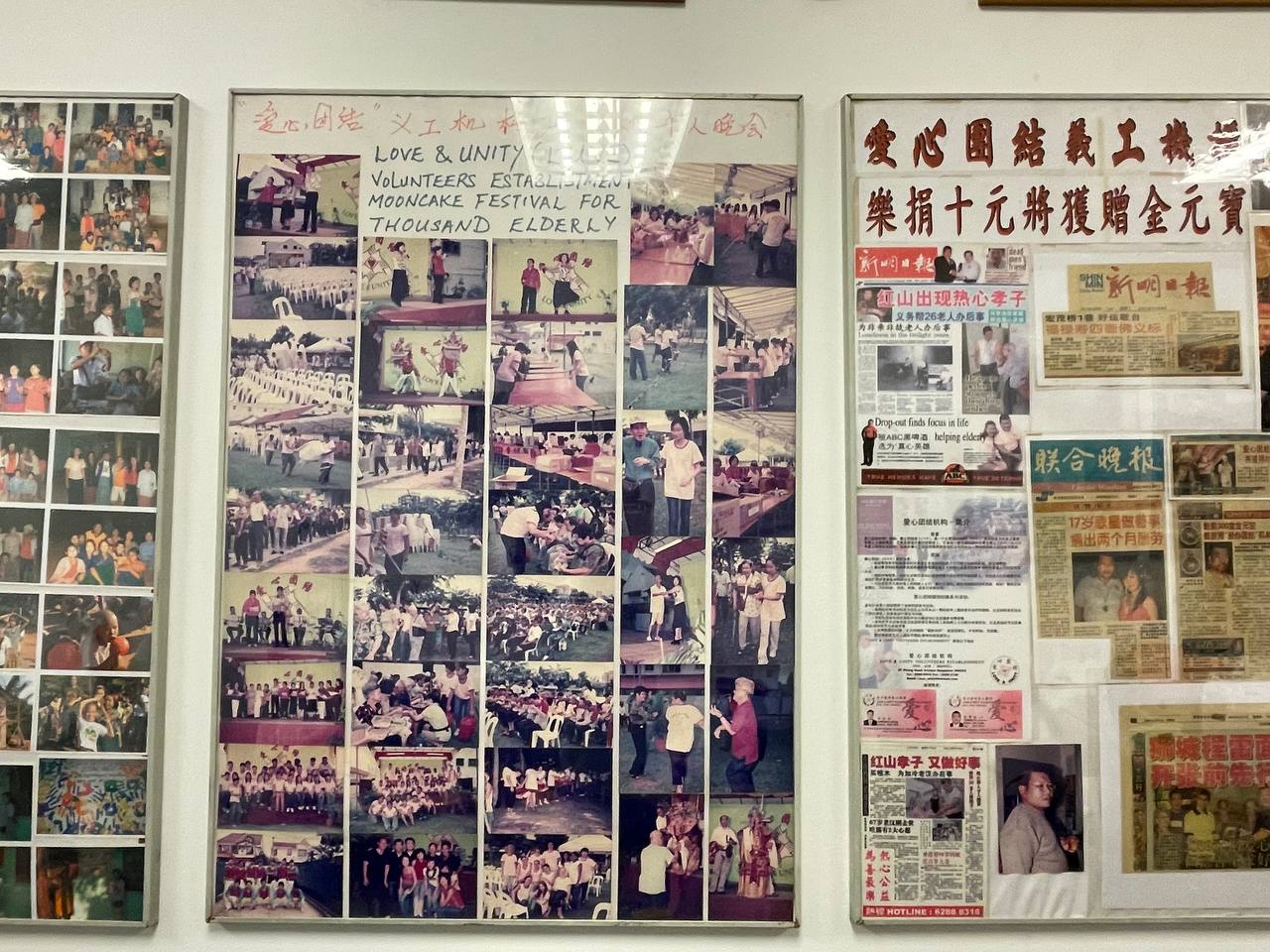 The photo frames in Yu's office feature old photographs and newspaper clippings from Luve's previous events.
The photo frames in Yu's office feature old photographs and newspaper clippings from Luve's previous events.
For Yu, an office of this size was already a big upgrade. In the early days of Luve, Yu would store items in his home, which barely had enough space to hold everything.
Luve continues to operate on a small scale today with a team of 30 volunteers, a number that has remained throughout almost four decades of operation.
The reason for a small team, Yu explained, is to save costs on basic forms of volunteer compensation, such as packet food during elderly activity events.
Furthermore, he said, many volunteers choose not to stay for the long term. Several generations of volunteers have already come and gone at Luve.
Since its inception, Luve relies almost entirely on donations from the public. They do not receive any additional funding from other sources, as Yu prefers that Luve remains an independent charity.
After Yu founded Seng Xiang Services in 1990, some proceeds from his commercial funeral service went into financing Luve's operations as well.
"At other organisations, you might be able to claim money from the government," he said. "You might expect an annual dinner and dance, or awards ceremony, or a hotel stay."
"But to date, our volunteers don't get any additional benefits—not even a single piece of toilet paper," he said. "So if you are doing volunteer work for the benefits or the recognition, then you shouldn't join our organisation."
"I'm not asking for any kind of returns from the dead people, or to win the lottery," he continued. "All I ask is that I stay healthy, so I can keep helping other people."
It started to strike me how selfless the entire endeavour was: Yu was managing a small organisation, running on whatever donations they could to get by, and without any expectation of reward.
Furthermore, with most other volunteer activities, you often also get the benefit of a "thank you" from the beneficiaries.
But as Yu pointed out to me, dead people have no way of saying that to you.
Always on standby
Yu often meets with estranged elderly through hospitals and old folks' homes.
He is also in contact with social workers, who would inform him whenever an estranged elderly person passes away.
When that happens, Yu often has to respond at short notice to arrange the funeral and cremation.
"We are on standby for 24 hours," Yu said. "People don't follow a schedule when they die. It could be in the middle of the night, at 5am, or at 10pm."
One important step in this process is to confirm that the dead elderly does, indeed, have no more next-of-kin who are willing to claim the body.
"We need to avoid a situation where we do a cremation, and then a few months later, someone comes around and says we cremated their husband!" he said.
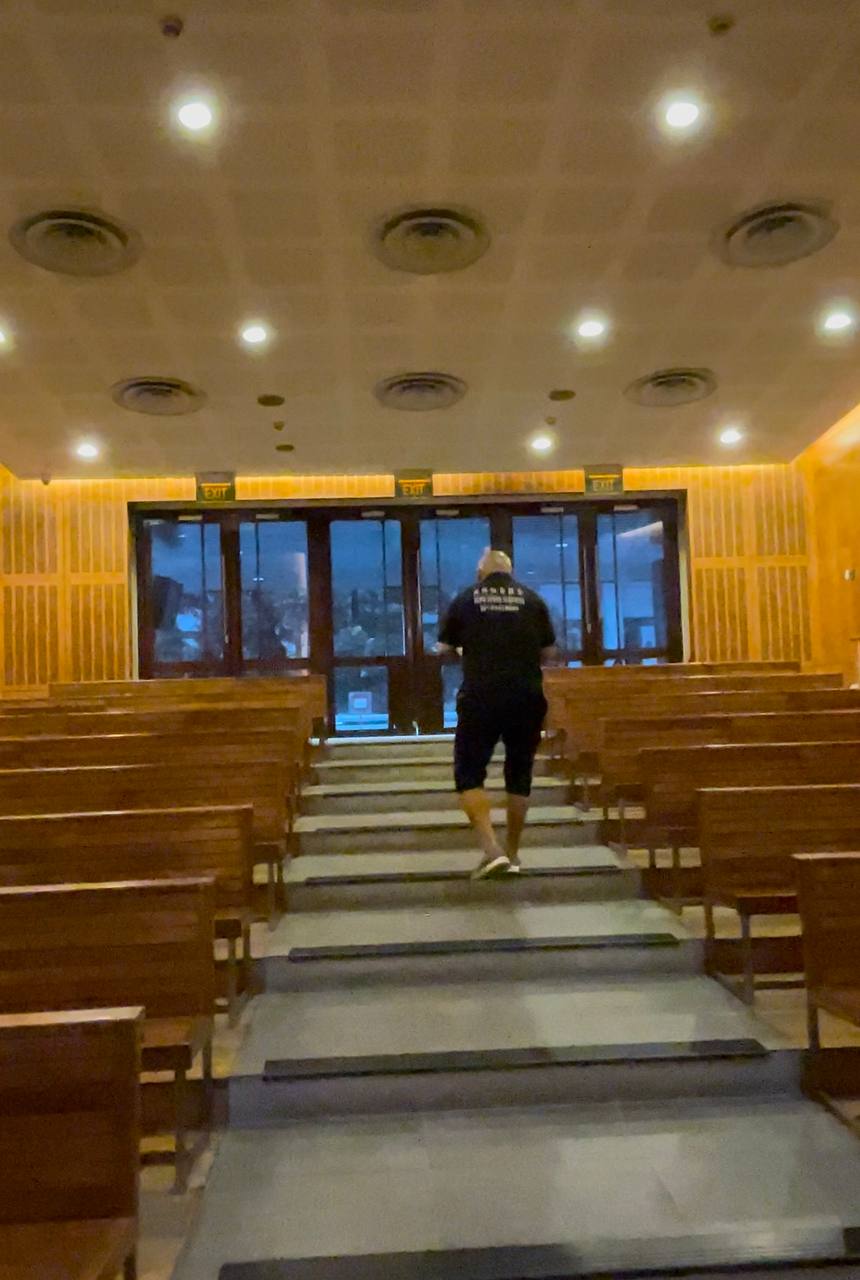 Yu walks up the stairs of the funeral hall.
Yu walks up the stairs of the funeral hall.
It sounds far-fetched, but he's had several close shaves before.
"There was someone who accused us of cremating their sister without their consent," he recounted.
"Fortunately, I got out the old documents. The social worker called them, and they were drinking beer in a coffeeshop. They said not to disturb them and hung up!
The social worker was stunned. Their sister had passed away, and they didn't care.
They only started to care now, because they wanted to claim their sister's CPF!"
Fortunately, the social worker's old reports laid out the facts very clearly, and Yu was able to resolve the dispute without implicating Luve.
"There was also this time when someone accused us of cremating their mother," Yu said. "I told them: your mother had died for three months, and you only realise she's dead now? What am I supposed to say to this person?"
Not wealthy, but rich
After the documentation process is done by the social worker, Yu will usually arrange for the cremation on the same day, followed by a sea burial later on.
But running a funeral is not cheap. Yu estimates that arranging each funeral costs at least S$1,300.
For a small, independent volunteer organisation, I wondered if Yu ever faced any financial difficulties in all his decades.
But Yu seems unfazed by the prospect of financial difficulties.
"Our organisation doesn't lack money," he said.
He continued:
"But that doesn't mean we are wealthy!
When we are most in need of money, someone will come in and donate. Then we will use the money, and when we are in need again, someone else comes in with a donation.
So our accounts will go up and down like that. It's not that we have hundreds of thousands of dollars, but I am able to peacefully carry out my work."
Financial difficulties used to cause him stress. But a chance event in 2004 gave Yu a lasting confidence in his organisation's ability to tide through the worst.
That year, Luve was in debt of some S$7,200.
With donations running dry, Yu thought it was time to close down the organisation once and for all. He even told his colleagues that they would no longer be arranging any funerals until the debt was settled.
It seemed that Luve had hit the end of the road.
But that very afternoon, Yu received a call from a social worker, who gave him an update about a deceased elderly person whom Yu helped the year before.
Yu recounted:
"It had been over a year, and the social worker still couldn't find any next-of-kin for this person.
In their will, the person wrote that if their next-of-kin couldn't be found, the inheritance should be passed on to the social service agency that helped them.
The social worker said it was Luve who helped with all the last rites. So, the money should rightfully go to Luve."
To his surprise and relief, Luve received a donation of S$10,500 from this person's will. That amount helped Luve to tide through this period, and it still continues to thrive today.
That was how Yu learned to be at peace with Luve's financial situation.
"This is what I believe," he said in Mandarin. "人在做, 天在看."
In other words: no matter what actions we take, the heavens are looking upon us.
Life after Luve
For many people, death can be a touchy topic.
But with decades of arranging funerals under his belt, Yu no longer feels daunted or afraid when he performs last rites for someone else.
As for his own death, he had already discussed the arrangements for his own funerals with his children.
"I told my children that when they visit me at the columbarium, they don't have to bring any incense," he said with a wide smile. "They just need to bring a cappuccino!"
"Just knock three times, and wave the coffee in front [of my ashes], in case I'm sleeping. I want to know when you come visit me."
On that note, I wondered if he had already made arrangements for Luve's continuity after he was no longer around. After all, it was an organisation he'd built from scratch for almost 40 years.
I was surprised by his straightforward response:
"I already told my wife what to do. Make sure the office is clean and empty, and then return it to the landlord. Make sure Luve isn't in any debt, and donate whatever money is remaining.
Once everything is settled, close the organisation."
Yu said this softly and slowly. It seemed to me that he had already made peace with Luve's dissolution.
"We don't get much out of doing the work we do," he said. "Who would want to spend their time doing this work?"
"It's not that I don't want it to continue. If any of my volunteers wants to carry on the organisation, the door is open," he said.
At peace with death
At first, I was surprised at Yu's casual attitude.
I mean, I would probably be more apprehensive if I was thinking about my own death, or the demise of my life's work.
But now that I think about it, when you work with dead people and confront death so much, maybe you eventually learn to be at peace with your own death.
Yu certainly seems rather unfazed.
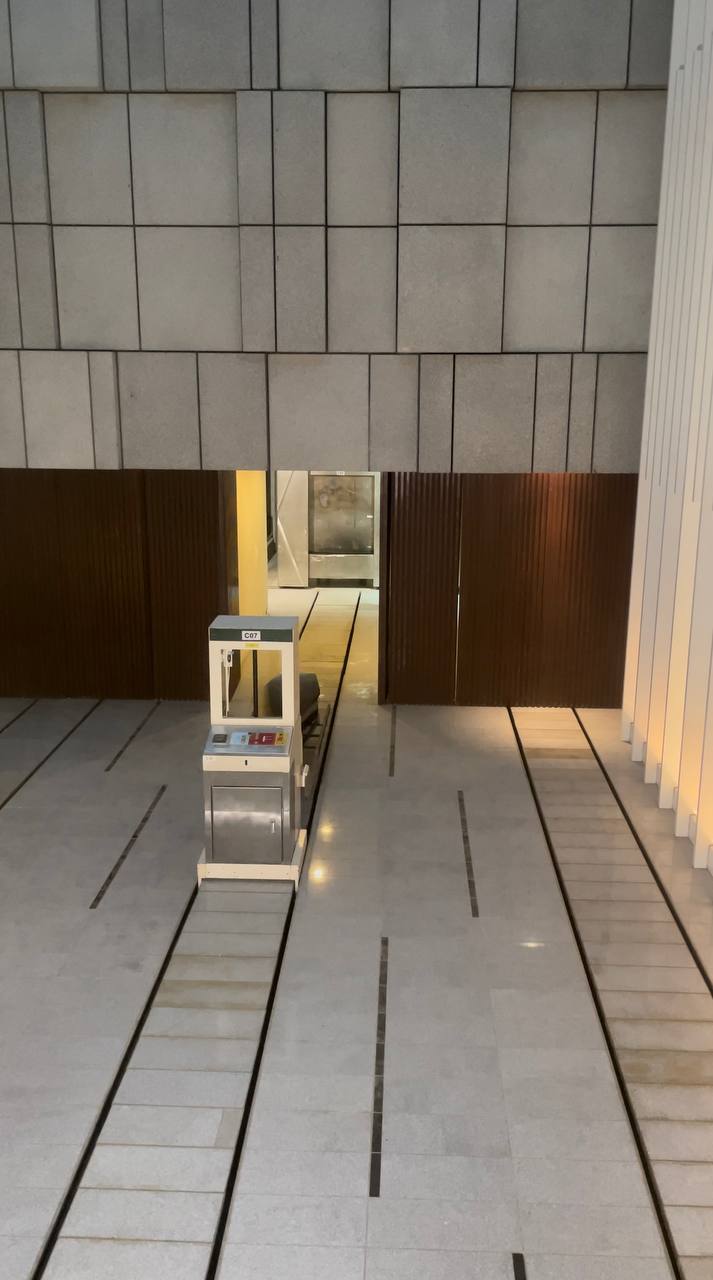 A body about to be cremated at Mandai Crematorium and Columbarium.
A body about to be cremated at Mandai Crematorium and Columbarium.
For now, Yu's mission is to continue ensuring that every elderly person feels at ease with death, even if they have no family to ensure their smooth passage.
With so many worries that already arise from growing old alone, Yu is determined to reassure them that if no one is there to arrange their funeral, he will.
And it almost seems appropriate that, after almost four decades of arranging funerals, Yu has planned one final set of last rites: a peaceful goodbye to the organisation that started it all.
Have something even more interesting going on in your neighbourhood? One-up us at [email protected].
Firsthand is a new content pillar by Mothership, featuring in-depth stories about people and their issues.

Top photo by Ryan Yeo
If you like what you read, follow us on Facebook, Instagram, Twitter and Telegram to get the latest updates.

